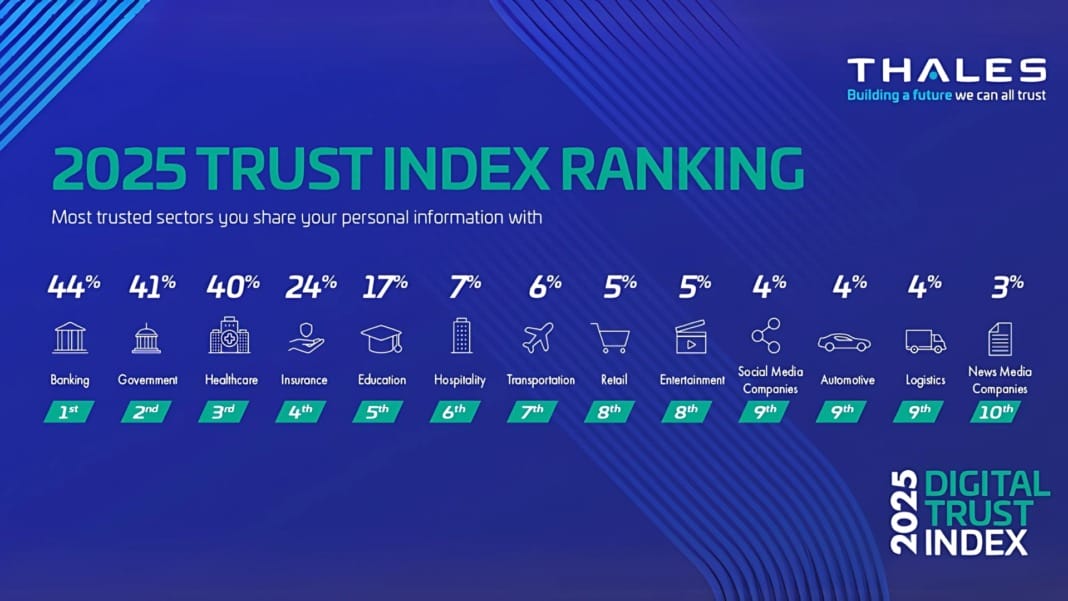Trust in digital services has dropped globally, according to the newly released Thales 2025 Digital Trust Index – Consumer Edition. The study reveals that consumers across the world are growing increasingly wary of how companies handle personal data, with many abandoning brands over privacy concerns.
Thales surveyed more than 14,000 consumers across 14 countries to assess their trust in digital services, including their views on data privacy and how brands can earn their confidence. The research found that, globally, trust levels have declined in nearly every sector over the past year, with only insurance, banking, and government showing stable or slightly improved ratings.
In Singapore, the trend is even more pronounced. Around 85% of consumers have abandoned at least one brand in the last 12 months, with 39% citing excessive demands for personal information as the main reason. This was the most common reason for switching brands, highlighting how central data privacy has become to consumer decisions.
Singapore’s trust landscape
Among all sectors surveyed in Singapore, government services came out on top, earning the trust of 67% of respondents. This was followed by banking at 49% and healthcare at 41%. At the other end of the scale, the automotive industry fared the worst, with only 2% of Singapore consumers ranking it among their most trusted sectors.
The findings come as 22% of Singapore respondents reported being notified of a data breach involving their personal information in the past year. This is above the global average of 19%, which may help explain the higher rate of brand abandonment in Singapore.
Daniel Toh, Chief Solutions Architect for Asia Pacific & Japan at Thales, said, “Trust in digital services is decreasing or remaining stagnant at best, even among highly regulated industries. One area that does not remain stagnant is the threat landscape. Consumers are more aware than ever before of online threats, and the consequences of their data falling into the wrong hands. As cyber threats evolve so does consumer scepticism, and brands must continuously adapt their security measures to stay ahead and rebuild confidence.”
Too much responsibility placed on users
Singapore consumers are not only concerned about data breaches but also feel overburdened when it comes to managing their own privacy. About 88% expect some level of data privacy protection from online services. However, 62% believe that the responsibility for safeguarding data is unfairly placed on consumers rather than companies.
This sense of frustration extends to customer experience as well. More than a third (38%) of Singapore consumers admitted they only shared their data with organisations because it was the only way to access a product or service. Only 43% said they shared data because they trusted the company to use it appropriately.
Customer experience issues remain widespread. At least 70% of Singapore consumers reported being dissatisfied with aspects of their digital experiences, such as being removed from online queues, encountering price changes, or facing website downtime. Globally, these issues are often linked to bad bots disrupting online services and manipulating purchasing behaviour.
Despite the overall decline in trust, consumers have made it clear what they expect from brands. Around 75% of respondents in Singapore said their trust in a company would rise significantly if it adopted advanced technologies such as passwordless authentication, biometrics, multi-factor authentication, and responsible use of AI.
John Tolbert, Director of Cybersecurity Research at KuppingerCole Analysts, commented, “The Thales Digital Trust Index findings should be alarming to enterprises that conduct business online. The global decrease in digital trust is not only quantifiable, but preventable. Deploying modern Customer Identity Access Management (CIAM), Fraud Reduction Intelligence Platforms (FRIP), GenAI, and data privacy protection solutions properly, with optimising the customer journey as the primary design principle, will lead to better business and consumer outcomes.”
As digital threats evolve and privacy expectations rise, brands will need to prioritise transparency, invest in stronger security technologies, and offer smoother user experiences to retain customer trust.





